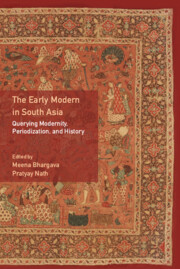6 - Markers of the Early Modern: Ecology, State, and Society in Rajasthan
Published online by Cambridge University Press: 06 September 2022
Summary
Defining any historical era is a difficult task, mainly because historical processes are never linear; they crisscross, overlap, and exhibit contradictory tendencies. To further compound the problem, in addition to addressing the issue of periodization, we are dealing with the category of modernity in this volume. Both these notions – periodization and modernity – have extremely chequered histories. For South Asia, these terms carry considerable historical baggage and are prone to misappropriation. One of the important components of the baggage, as pointed out in the introduction to this volume, is the tendency to evaluate Indian history with a Eurocentric approach. Following the conventional division of European history into the classical ancient, the dark medieval, and the rational modern, the Indian past too was categorized into the Hindu or ancient, Mohammedan or medieval, and British or modern periods. This categorization of Indian history along religious lines at the hands of British colonial administrator-historians restricted the evaluation of India's past in terms of other variables for a long time. Departures towards the modern and the concomitant rupture from past has never been a straight path for any society. It is in response to these concerns that the category of early modernity has emerged in historical thinking in recent decades. However, expecting the beginning of the early modern condition in all the societies at the same time and in the same measure may also lead us into problematic territory. Every society went through different processes to the extent that even the most prominent features of early modernity manifested at different point of time in different places. For much of the Indian subcontinent, the early modern condition in the field of political economy comprised the rise of the centralizing administrative machinery of the Mughal Empire during the sixteenth and seventeenth centuries. For Rajasthan, however, the arrival of early modernity was signified by transition from tribal kin-based political formations to centralized state apparatus in course of the seventeenth century.
It should also be noted that conventional historiography on India between the sixteenth and eighteenth centuries has not accorded due importance to environmental factors. A plausible reason could be the kind of sources that historians have traditionally relied upon – Persian court chronicles and vernacular literary texts, which did not furnish a lot of information about environmental conditions.
- Type
- Chapter
- Information
- The Early Modern in South AsiaQuerying Modernity, Periodization, and History, pp. 124 - 140Publisher: Cambridge University PressPrint publication year: 2023



